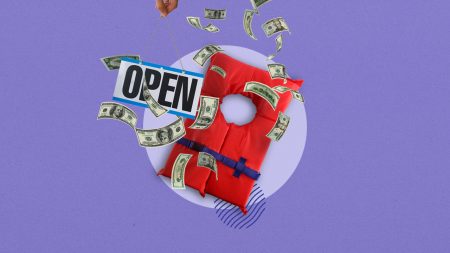kate_sept2004/ Getty Images; Illustration by Austin Courregé/Bankrate
Key takeaways
- SBA 7(a) loan rates range from 10.50 percent to 15.50 percent, depending on whether it’s a fixed or variable rate loan
- The SBA limits interest rates to keep loans accessible to financially disadvantaged businesses
- Loans over $1 million also come with guarantee and service fees
The Federal Reserve is holding interest rates steady despite a higher inflation prediction, meaning more affordable financing options may not be as readily available for small business owners. SBA loans are backed by the U.S. Small Business Administration and have maximum interest rates that can be far lower than other loans. While SBA loan rates tend to be lower than average business loan rates, the exact rate a business receives depends on the lender and the loan amount.
Bankrate insight
SBA 7(a) loans
SBA 7(a) loans are the most common type of SBA loan. There are several types of 7(a) loans, including:
Most SBA loans are subject to maximum fixed or variable interest rates — regardless of your lender. The only exception is Export Working Capital loans, which don’t have a maximum rate limit set. Below are the maximum rates for all other types of 7(a) loans.
Bankrate insight
Interest rates: SBA 7(a) variable rate loans
| 7(a) loan amount | Maximum rate |
|---|---|
| $50,000 or less | 14.00% |
| $50,001 to $250,000 | 13.50% |
| $250,001 to $350,000 | 12.00% |
| Over $350,000 | 10.50% |
SBA loan rates current as of March 2025; calculated with current prime rate of 7.50%.
Interest rates: SBA 7(a) fixed-rate loans
| 7(a) loan amount | Maximum fixed rate |
|---|---|
| $25,000 or less | 15.50% |
| $25,000 to $50,000 | 14.50% |
| $50,001 to $250,000 | 13.50% |
| Over $250,000 | 12.50% |
SBA loan rates current as of March 2025; calculated with current prime rate of 7.50%.
Bankrate insight
How SBA 7(a) rates are set
As with any business loan, your SBA loan interest rate varies based on your business’s finances, creditworthiness, loan size and term, the lender you work with, your industry and other factors.
The SBA sets maximum rates for fixed and variable loans, meaning your chosen SBA 7(a) loan can’t exceed set rates. Maximum fixed interest rates are published on SBAs FTAwiki. For variable-rate loans, the maximum is the base rate plus a set interest rate determined by the loan’s maturity date:
| Loan amount | Variable rate |
|---|---|
| $50,000 or less | Base rate + 6.5% |
| $50,001 to $250,000 | Base rate + 6.0% |
| $250,001 to $350,000 | Base rate + 4.5% |
| Over $350,000 | Base rate + 3.0% |
The base rate for a variable loan can be based on one of the following:
- Prime rate: Interest rate based on the federal funds rate set by the Federal Reserve
- Optional peg rate: Interest rate published by the SBA on a quarterly basis
When comparing loans, try using a business loan calculator to see how different rates affect your monthly payments.
SBA 7(a) loan fees
SBA 7(a) loans don’t charge common fees found with other business loans, such as processing fees, origination fees and application fees. But you will have to pay guarantee fees and annual service fees.
Guarantee fees help cover the SBA’s costs if the loan defaults. Service fees compensate lenders for their participation and issuing of SBA loans. Lenders cannot pass on annual service fees to a borrower.
Most SBA loans are guaranteed up to 85 percent for loans of $150,000 or less and up to 75 percent for loans over $150,000. Express loans have a 50 percent maximum guarantee, and Export Express, Export Working Capital and International Trade loans have a 90 percent guarantee maximum.
SBA annual service fees
According to the SBA, the annual service fee based on the 2025 fiscal year — beginning Oct. 1, 2024 — is based on the total loan amount:
| Loan amount | Service fee for new loans |
|---|---|
| $500,000 or less | 0% |
| $500,001 to $1,000,000 | 0.17% of the guaranteed portion of the outstanding loan balance |
| $1,000,001 to $5,000,000 | 0.55% of the guaranteed portion of the outstanding loan balance |
SBA guarantee fees
The SBA guarantee fee for short-term loans paid off in 12 months or less based on the 2025 fiscal year is:
| Loan amount | Guarantee fee for loan terms under 12 months |
|---|---|
| $1,000,000 or less | 0% |
| $1,000,001 to greater | 3.50% of the guaranteed portion up to and including $1,000,000; plus 3.75% of the guaranteed portion above $1,000,000 |
The SBA guarantee fee for loans that take more than 12 months to pay off based on the 2025 fiscal year is:
CDC/504 loans
SBA 504 loans are available through certified development companies (CDCs). CDCs are certified by the SBA to regulate nonprofits and promote community economic development. A CDC can help you gather what you need for a 504 loan and help you find the right lender.
A 504 loan is a long-term, fixed-rate loan meant to help grow a business. It can be used for major fixed assets, like buying real estate, such as land and buildings, machinery and equipment. But it can’t be used for working capital or to buy inventory.
CDC/504 loan terms
Loan terms for 504 loans are 10, 20 or 25 years. The maximum loan amount for a 504 is $5.5 million. Like SBA 7(a) loans, 504 loans are subject to maximum interest rates and additional fees.
How SBA 504 loan rates are set
Businesses are required to make a down payment of 10 percent on 504 loans. From there, the CDC funds 40 percent of the loan and the chosen lender funds 50 percent. The SBA guarantees the 40 percent funded by the CDC.
Lenders set the loan terms and interest rates but are subject to SBA standards. Interest rates for 504 loans are typically 3 percent of the total debt and are determined by the current market rate for 10-year U.S. Treasury bonds. Any fees for 504 loans can be included in the financed amount.
Frequently asked questions about SBA loan interest rates
Read the full article here












